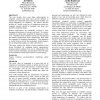Free Online Productivity Tools
i2Speak
i2Symbol
i2OCR
iTex2Img
iWeb2Print
iWeb2Shot
i2Type
iPdf2Split
iPdf2Merge
i2Bopomofo
i2Arabic
i2Style
i2Image
i2PDF
iLatex2Rtf
Sci2ools
CHI
1999
ACM
1999
ACM
A Better Mythology for System Design
The past decades have seen huge improvements in computer systems but these have proved difficult to translate into comparable improvements in the usability and social integration) of computers. We believe that the problem is a deeply rooted set of assumptions about how computer systems should be designed, and about who should be doing that design. Human organizations are continually evolving to meet changing circumstances of resource and need. In contrast, computers are quite rigid, incapable of adaptation on their own. Therefore when computer systems are incorporated into human organizations, those organizations must adapt the computers to changing circumstances. This adaptation is another human activity that technology should support, but our design philosophies are oddly silent about it. This paper explores the origins of these problems in the norms developed for managing human organizations, proposes partial solutions that can be implemented with current systems technology, and sp...
| Added | 02 Aug 2010 |
| Updated | 02 Aug 2010 |
| Type | Conference |
| Year | 1999 |
| Where | CHI |
| Authors | Jed Harris, D. Austin Henderson Jr. |
Comments (0)

